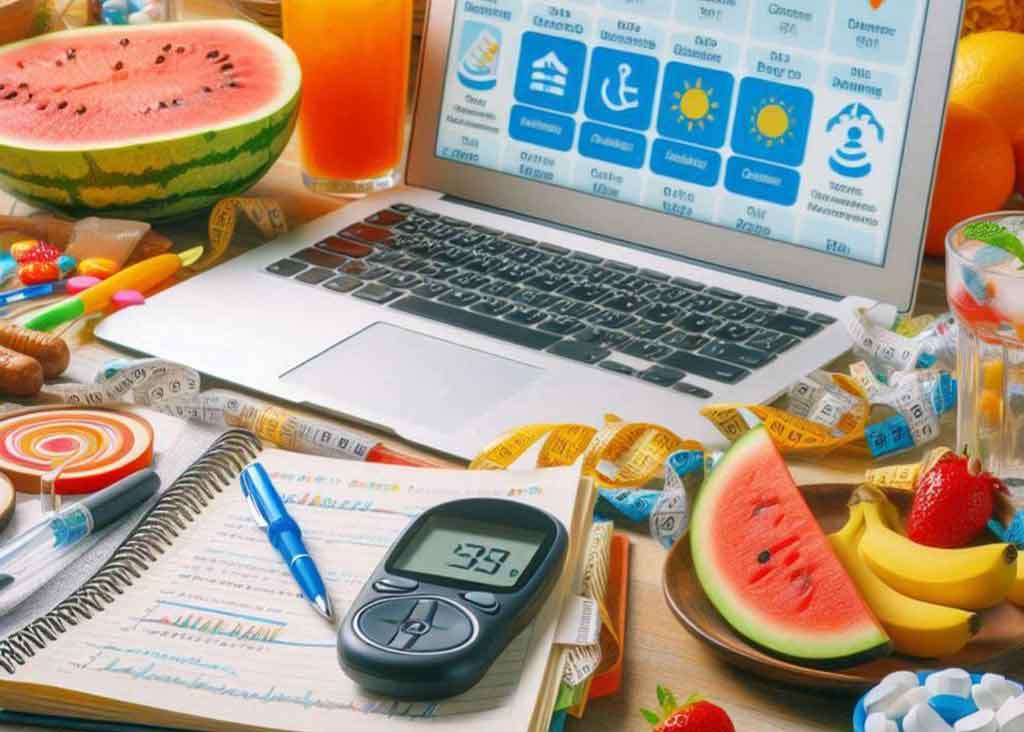Beating the Heat: A Diabetic's Summer Game Plan

Summer brings warmth, longer days, and opportunities for outdoor activities, but for individuals with diabetes, it also presents unique challenges. Managing blood sugar levels during the hotter months requires extra vigilance, as heat, dietary changes, and altered routines can impact diabetes control. This blog explores the precautions diabetics should take regarding food, exercise, and other factors to stay healthy and safe during summer.
1. Food Precautions for Diabetics in Summer
Summer often means barbecues, picnics, and refreshing treats, but dietary choices can significantly affect blood glucose levels. Here’s how to navigate food choices wisely:

- Watch Out for Sugary Beverages: Summer staples like sodas, sweetened iced teas, and fruit punches can cause rapid blood sugar spikes. Opt for unsweetened teas, infused water (e.g., cucumber or lemon), or sparkling water. If you’re craving flavor, use a small amount of fresh fruit or a sugar-free sweetener.
- Be Cautious with Ice Cream and Frozen Treats: Ice cream, popsicles, and other frozen desserts are tempting in the heat but often contain high amounts of sugar and carbs. Choose sugar-free or low-carb options, or make your own using natural sweeteners like stevia and fresh fruit. Always check portion sizes to avoid overindulgence.
- Mind the Carbs at Barbecues: Summer cookouts often feature carb-heavy foods like buns, potato salad, and pasta dishes. Balance your plate by prioritizing non-starchy vegetables (like grilled zucchini or salads), lean proteins (like chicken or fish), and small portions of complex carbs (like quinoa or sweet potato). Avoid sugary sauces and dressings, which can hide extra carbs.
- Stay Hydrated with Water: Dehydration can raise blood sugar levels and increase the risk of heat-related illnesses. Aim to drink plenty of water throughout the day, especially if you’re spending time outdoors. Avoid alcohol or limit it, as it can interfere with blood sugar regulation and contribute to dehydration.
- Pack Smart for Travel: Summer vacations or day trips can disrupt meal planning. Carry low-carb snacks like nuts, seeds, or veggie sticks to avoid relying on unhealthy options. If eating out, research restaurant menus in advance to find diabetes-friendly choices.
Pro Tip: Test your blood sugar more frequently during social events or when trying new foods, as unexpected ingredients can affect glucose levels.
2. Exercise Precautions for Diabetics in Summer
Physical activity is crucial for managing diabetes, but summer heat and humidity require extra care to exercise safely:
- Avoid Peak Heat Hours: Exercising in extreme heat can lead to dehydration, heat exhaustion, or heatstroke, which are particularly risky for diabetics. Schedule workouts for early morning or late evening when temperatures are cooler. If you’re outdoors, seek shaded areas or indoor alternatives like gyms or home workouts.
- Stay Hydrated: Drink water before, during, and after exercise to prevent dehydration, which can elevate blood sugar levels. For longer workouts, consider electrolyte-enhanced drinks (sugar-free) to replace lost minerals, but consult your doctor first.
- Monitor Blood Sugar Levels: Exercise can lower blood sugar, but heat and stress may cause unpredictable fluctuations. Check your glucose levels before and after physical activity, and carry a fast-acting carbohydrate source (like glucose tablets or fruit juice) in case of hypoglycemia.
- Wear Appropriate Gear: Protect your feet with breathable, well-fitting shoes and moisture-wicking socks to prevent blisters or infections, as diabetics are prone to foot complications. Use sunscreen and wear light, loose clothing to avoid sunburn and overheating.
- Know the Signs of Heat-Related Issues: Symptoms like dizziness, nausea, or excessive sweating could indicate heat exhaustion or low blood sugar. Stop exercising immediately, hydrate, and check your glucose levels if you feel unwell.
Pro Tip: Low-impact activities like swimming or water aerobics are excellent summer options, as they keep you cool while supporting cardiovascular health.
3. Other Summer Precautions for Diabetics
Beyond food and exercise, several other factors require attention to manage diabetes effectively during summer:
- Protect Your Medications and Supplies: Heat can degrade insulin, test strips, and other diabetes supplies. Store insulin in a cooler (not in direct contact with ice) when traveling, and avoid leaving supplies in hot cars or direct sunlight. Check expiration dates and replace any supplies exposed to extreme temperatures.
- Monitor for Hypoglycemia and Hyperglycemia: Hot weather can mask symptoms of low or high blood sugar, as sweating or fatigue may be mistaken for heat-related discomfort. Regular blood sugar checks are essential, especially during outdoor activities or after meals.
- Plan for Travel and Routine Changes: Summer vacations or irregular schedules can disrupt your diabetes management routine. Pack extra supplies, including medications, test strips, and snacks. Inform travel companions about your condition and how to assist in case of an emergency.
- Be Prepared for Emergencies: Carry a medical ID that indicates you have diabetes, especially when traveling or engaging in outdoor activities. Keep a list of emergency contacts and your doctor’s information handy.

4. Tips for a Healthy Summer with Diabetes
- Work with Your Healthcare Team: Before summer begins, consult your doctor or a certified diabetes educator to adjust your meal plan, insulin doses, or medications based on your activity level and climate changes.
- Stay Consistent with Monitoring: Even with a busy summer schedule, stick to your blood sugar testing routine. Continuous glucose monitors (CGMs) can be especially helpful for real-time tracking during outdoor activities.
- Enjoy Summer Mindfully: You don’t have to miss out on summer fun. Focus on balance—savor small portions of your favorite treats, stay active in safe ways, and prioritize self-care to keep your diabetes in check.
Conclusion
Summer can be a vibrant and enjoyable season for individuals with diabetes, but it requires careful planning and awareness. By making smart food choices, exercising safely, and taking precautions with medications and skin care, you can manage your diabetes effectively while soaking up the joys of summer. Stay proactive, listen to your body, and consult your healthcare team to ensure a healthy and happy season.
Disclaimer: Always consult your healthcare provider before making changes to your diabetes management plan, especially regarding diet, exercise, or medication adjustments.
Join our community today and take the first step towards a healthier, more balanced you.
Note: This is for informational purposes only and should not replace professional medical advice. Always consult a healthcare professional before starting any new treatment or session.
Photo: @Freepik, @unsplash @microsoft designer

